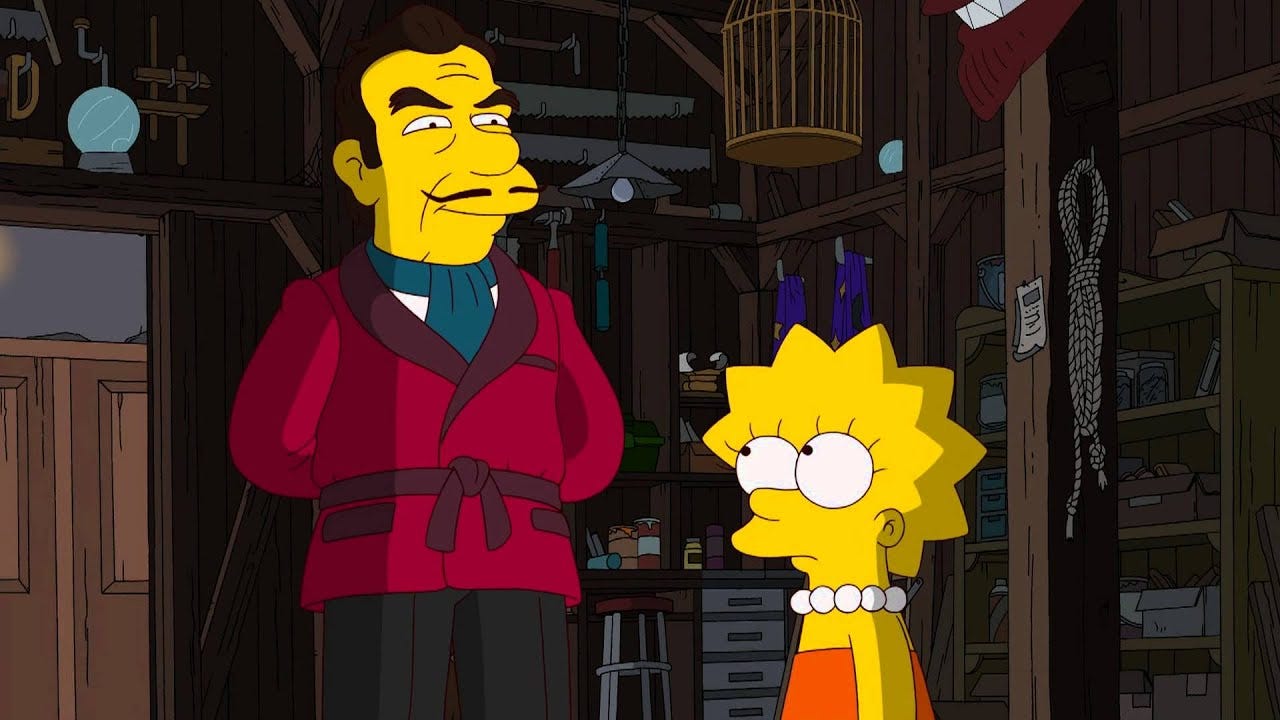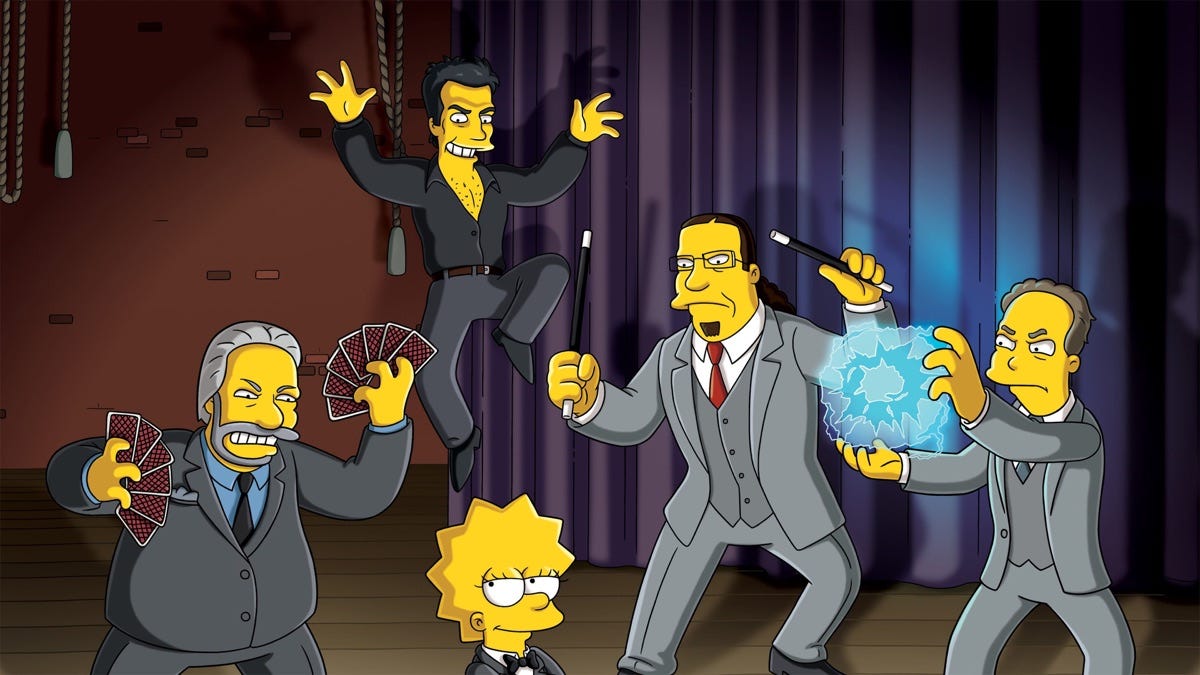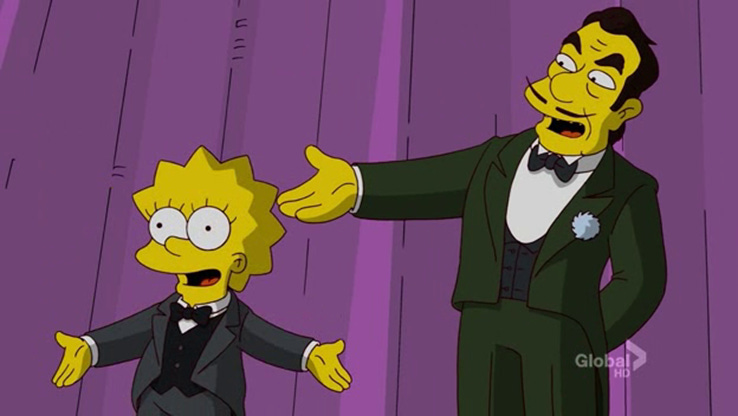"The Great Simpsina" and How to Grade The Simpsons After the Show Lost its Magic
A quality late-season episode featuring Martin Landau as an aging magician raises questions about how to regard the show after its glory years.
At some point, I started grading The Simpsons on a curve. It’s the common consensus now, after the show has been middling for (at least) twice as long as it was good, but there was once a time when such a thing would seem like a grave insult to the Greatest Television Show of All Time™. How could the series that gave us Steamed Hams, the Monorail Song, and Homer gazing pensively into the evening sky, be given credit for merely showing up and not breaking anything?
And yet, here we are. “The Great Simpsina” would be, at best, a lesser light in The Simpsons’ glory years. As I discussed on The Simpsons Show Podcast, the tale of Lisa becoming the apprentice to an elderly magician, betraying his trust, and restoring his faith in the next generation, levels out somewhere around “perfectly cromulent” in terms of quality. But in the bowels of season 22, smack dab in the middle of Al Jean’s middling second tenure as showrunner, the episode is a highlight -- if only for the company it keeps.
Because it gets to the point, dispensing with a rapid-fire flurry of pre-plot peach-picking gags quickly. Because it has an array of solid jokes: from a quality Grampa ramble, to lines about tonic not being all that essential to a good G&T, to Lisa tossing her magical implements into the garbage only to see them pop right back on the shelf. Because it has a clear beginning, middle, and an end, however rocky the path may be to get from one to the next.
Mostly, though, it’s because it has a few essential ingredients that were easy to take for granted in the show’s golden years, but became all too scant afterward: genuine conflict, connection, and heart. Lisa doesn’t merely find a generic magic teacher whose sole purpose is to instruct her in the way of sleight-of-hand. Instead, she develops an earnest friendship with this wistful old gent whose best years are behind him, but who finds hope in Lisa, as she comes to represent the child he and his wife were never able to have.
In truth, “The Great Simpsina” is cheating a little. Lisa’s magical mentor, The Great Raymondo, is voiced by Martin Landau. While the episode largely forges his character’s bond with Lisa through charming but slight montages and a few good lines, chumps like me are liable to see the parallels between Landau’s role here and his turn as Bela Lugosi in Ed Wood, thereby giving the relationship some unearned resonance. It’s not hard to see the friendship between Lisa and Raymondo as akin to the warm, if complicated, one between the earnest Wood and the washed-up Lugosi in Tim Burton’s classic film, and superimpose the latter onto the former.
Thankfully, The Simpsons does at least some of its own work. It not only sets up the plot relevance of the famous milk can trick, a secret illusion that Raymondo only teaches to Lisa once she’s proven her commitment. But it also sets up what the trick means to him, a reflection of the dearly departed wife he misses dearly and passes onto Lisa as a way of keeping the memory of their love and partnership alive.
So when Raymondo finally does teach it to her, and Lisa performs it for her classmates, it’s triumphant for both of them. The student has earned her master’s trust and proves herself worthy of his blessing. The audience gets the thrill of seeing the much-ballyhooed illusion pulled off after a suitable amount of secrecy and fanfare. It’s downright lovely.
And when a trickster charms Lisa into giving away the biggest trick of Raymondo’s trade to his archenemy, it’s meaningful -- not just because the villain represents a total disrespect for everything Raymondo values, but because Lisa’s given away something we understand as precious to him. It’s a dovetailing of plot and sentiment the series couldn’t always pull off in its latter years.
Unfortunately, the villain in question is an utter chore of a character. In truth, it is tough to judge “Magicfreek” Cregg Demon, a paper-thin parody of Criss Angel’s Mindfreak. Every second he’s on screen is painfully annoying. The catch is that he’s clearly meant to be annoying, so it’s hard to slate the show for doing its job too well. That said, the character spoof is also supposed to be, you know, funny. Instead, his awful lines about hell skanks, being a terrible father, and communing with the ghost of Houdini elicit eye-rolls rather than laughs. Everything involving him and his son is just plain dumb, and not in an entertaining way, which hinders the proceedings considerably.
I’m sorry to say the same is true for Homer. The humor in “The Great Simpsina” is a mixed bag, with more in the way of chuckles than guffaws, but also more hits than misses. Sadly, the bulk of those misses belong to the Simpsons' patriarch. Whether he’s shaking Bart upside down trying to find prizes, dropping unfunny lines about Judas “getting paid”, falling asleep in nets, or yelling at the dial tone, every time he pops up, you can expect the comedy quotient to drop to zero.
All that said, there are still a few comic gems here. The bullies yearning for something to hock at a lantern festival, followed by Bart showing up with a wagon full of peaches, only for the ruffians to choose to chuck Bart instead, is a classic Simpsons swerve. Landau’s loose patter comes with a charm all its own, especially when he’s talking about something absurd like dressing a bird in a leisure suit. And there’s something amusingly strange but also sincerely sweet about Nelson threatening God himself if Lisa doesn’t make it out of her trick alive.
That’s what really boosts “The Great Simpsina” -- a subtle undercurrent of sweetness. The narrative is shaky in several places, relying on a rapid pace and plot that moves at the speed of light in the hopes the audience won’t notice the seams. But at its core, this is a story founded on fatherly affection, broken trust, sincere regret, and a moving reunion between Raymondo and Lisa. Regardless of the machinations and magic act thievery at play, you care about their relationship; you understand why there’s bad blood between them, and you want Raymondo to hear Lisa out even when she’s disappointed him.
Unfortunately, the episode picks an utterly bizarre way to dramatize that. After Cregg Demon steals the milk can trick, he aims to perform it at the World Magic Championship, desecrating it with Kelis songs and pelvic thrusts and an unearned sense of entitlement to Harry Houdini’s legacy. When it becomes clear that something’s gone wrong with the trick, and Demon’s life is in danger, Lisa begs her mentor to intervene and save him. But he ignores his pupil’s pleas, a sign of his jadedness and indifference, no matter how much magic Lisa brought back into his life. It’s a dilemma meant to illustrate the issues between them, and how Raymondo decides to handle it will make all the difference.
Then, for some reason, instead of confronting the psychology of that moment, we interrupt the proceedings with a bunch of real life magicians who resort to all manner of bonkers shenanigans in a bid to stop Cregg Demon from tarnishing their profession. Sigh.
You were so close, Simpsons! For some reason, in an episode chock full of a sound story and a more grounded conflict, the show’s final act loses itself in the sort of zany hijinks that characterized the show’s worst stretch. Celebrities Penn & Teller, David Copperfield, and Ricky Jay play themselves in needless cameos. In an episode that already verged on Looney Tunes with Lisa’s tricks, the guest illusionists can fly and charge up hadoukens and basically perform real life wizardry. They’re halted by Raymondo crashing a lighting rig onto them like they’re Scooby Doo villains. The whole thing plays like a dose of Mike Scully era insanity rather than a natural extension of the episode to that point.
Somehow, though, it still ends with The Great Raymondo listening to Lisa and choosing to save his archrival, rather than giving into his bitterness, an act which honors their bond. He ultimately gives Lisa a magical moniker of her own, a sign of him passing down his legacy to her and being at peace with the next generation of magicians rather than scornful of them. And in a (presumably Burns-approved) ether hallucination, he even gets one last dance with his dear wife.
Is it perfect? No. Do the painful interludes with Homer and Cregg Demon, and the baffling celebrity nonsense near the end drag this one down? Absolutely. But by god, “The Great Simpsina” buckles down and tells a story, with just enough heart and humor to pass muster. In the thick of the show’s most committed stretch of bland mediocrity, I will take that.
But then again, maybe I’m The Great Raymondo, jaded and indifferent when surveying the landscape of something I once adored in its heyday. Because when I reviewed this episode live in 2011, I loved it. I loved the story. I loved the humor. I even loved the fourth act parade of guest stars. I guess the trick’s on me, folks.
Am I more discerning now, with a broader perspective and the benefit of hindsight, even as I damn a decent outing with faint praise? Or was I more open and amenable then, willing to accept the show for what it is now rather than deride it for what it wasn’t anymore? I honestly don’t know.
The Simpsons has changed over the years, but so have we. In a time when the show seems to have turned a corner once more, it’s worth striving to take a page out of The Great Raymondo’s book and remaining open to the next wave of creative people sharing their dreams with us -- even as diehards like me still find ourselves dancing with the ghosts of our old favorites.
Odd and Ends:
It’s not exactly the same, but this episode is of a piece with season 13’s “The Lastest Gun in the West”, where Bart befriends an old movie cowboy and things go terribly awry, right before the aging entertainer pulls off a daring rescue.
Poor Jack McBrayer, reduced to playing a nothing character who sings an irksome peach song.
“Madame and Masseur” remains a solid sign gag.
I’m pretty sure the frogurt guy is in line at the Magic Palace for some reason.
I do wish there were more grounded magician gags and fewer “It’s animated, so we can do anything!” magician gags.
Lisa clearing off the cobwebs on a book entitled The History of Cobwebs is just silly enough to tickle my funny bone.
If the creative team was so dead set on bringing back Lunchlady “Dora”, the least they could do to honor deceased voice actress Doris Grau is give the character better jokes than tacked on lines about religious boyfriends.







